
Vladimir Putin recognized last month that it was an “ecological catastrophe”. The oil spill which has affected south-west Russia and annexed Crimea since mid-December, due to the sinking of two oil tankers, continues to spread with pollution detected on new beaches, the authorities announced on Thursday.
On December 15, two Russian tankers, Volgoneft-212 and Volgoneft-239, ran aground during a storm in the Kerch Strait between Russia and Crimea. These ships were carrying 9,200 tonnes of fuel oil, approximately 40% of which may have spilled into the sea.
VideoSinking of two Russian tankers in the Black Sea, tons of fuel oil spilled
Authorities and volunteers have organized a large-scale clean-up operation, but the situation continues to cause concern. “Two sites polluted by petroleum products have been detected in Crimea”, the Ukrainian peninsula annexed by Russia in 2014, the Russian Ministry of Emergency Situations said in a press release on Thursday. These places are located near the beach in the town of Kerch and, further south, near Lake Tobetchiskoe, he said.
Since the start of the oil spill, nearly 73,000 tonnes of contaminated sand have been removed from dozens of kilometers of beach on the Russian coast, but in total some 200,000 tonnes may have been affected, according to authorities.
The regional clean-up organization released images of volunteers removing polluted sand using shovels, including in the resort town of Anapa in Russia. Photos and videos from an amateur posted two days after the sinkings bear witness to the disaster.
In December, however, scientists estimated that volunteers did not have adequate equipment to deal with such a disaster.
Vladimir Putin's spokesperson, Dmitri Peskov, said the extent of the damage caused to the environment was “at the moment impossible to calculate.”





